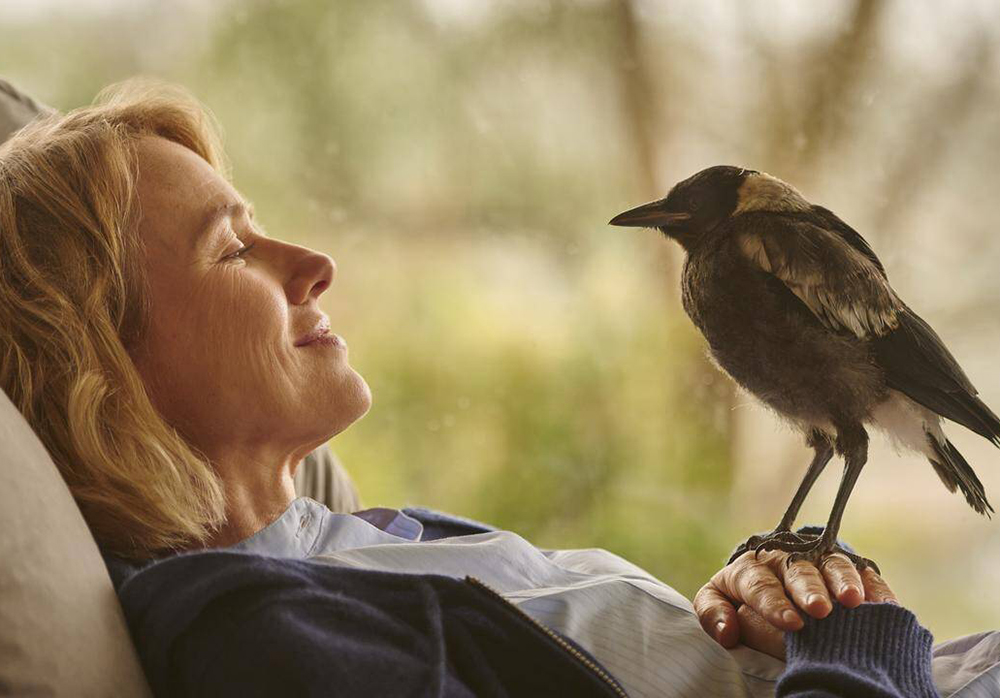“Penguin Bloom” is a phenomenally directed Australian-American film, narrating the true, hard-to-believe account of how Sam Bloom (played by Naomi Watts) found her strength and inspiration to embrace life, once again, years after a tragic accident during a Thailand vacation left her body paralysed. What makes Sam’s story so interesting is a little, Australian magpie bird, whose eventual entry in the Bloom family, helped Sam accept life’s vicissitudes in the most liberating way, at a time when surviving her days seemed an impossible dream. “Penguin Bloom,” directed by Glendyn Ivin, combines several human elements skillfully-woven into a slow-burn masterpiece drama. It gently tackles the subject of complex relations that we often share with our family members, and explores the surprising relation of humans with animals. Moreover, what the Bloom family witnessed in due course of time wholeheartedly embraces the belief that “our good actions do find their way back to us.”
Portraying Sam Bloom was no ordinary role for Watts, as it required a terrific personalisation of a high degree of bodily pain, mental frustration, and despondency—the likes of which have been experienced in real life only by a few. Watts’ acting is fresh, riveting, and is successful in sharing with the world a part of Sam’s moving and life-changing experience.
Andrew Lincoln plays Cameron Bloom, Sam’s caring husband and a responsible father of three young boys. His character is one of a very hardworking and disciplined man—from sharing Sam’s physical and mental struggles in her everyday life to being the family’s breadwinner—he leads every job without the slightest sign of a complaint or fatigue on his face. And although seeing men like Cameron is a rare sight, both on-screen and off-screen, his commendable role still gives a terrific blow to the idea of “men can’t do it all.” Sam’s oldest son, Noah Bloom (Griffin Murray-Johnston), is another key role in the story. If it weren’t for Noah’s sensible and affectionate nature toward animals, the Bloom family wouldn’t get to see Penguin (the pet name given to the magpie bird) in the first place, and consequently, none of the magic would have taken place in Sam’s life.

This story of a little bird helping a woman with her life’s struggles in Australia first reached the world through the book “Penguin the Magpie: The Odd Little Bird Who Saved a Family,” co-authored by Cameron Bloom, along with Australian writer Bradley Trevor Greive. The book, published in 2016, turned out to be a master inspiration for the movie. Bringing this story to the screen has been a challenging task. And doing justice to the novelty of this story are some awe-inspiring, cutting-edge direction skills that can be seen in the film, with the most noticeable of them being the near-real views of the black bird freely walking and taking short flights in the Blooms’ house from one room to another—leaving viewers awestruck by the scenes’ life-like dynamics.
Another creative aspect of the movie is that the screen-time has been adjusted in a way that gives the audience ample time to understand the context, and doesn’t make the story look rushed—unlike a lot of films made in these times that are often lost with their focus. The story is well-balanced with the past and present elements of the subjects, leaving no gap in achieving an impressive cinematic outlook. The mere first five minutes of the film can convince you that you’re set to watch something incredible and well-created. And as the story progresses, soon you’ll find yourself immersed in a humble and transformative journey, which will leave you with lots to take away.
“Penguin Bloom” is no ordinary story. It touches you on a very different level and resonates with you in ways you didn’t know existed. It can very well be seen as one of the most humble yet unique directions of this age. It can replant, in our hearts, the seeds of kind actions.
‘Penguin Bloom’ is available to watch on Netflix. It was previously included in our capsule review coverage of the Toronto International Film Festival (TIFF), which you can read here.


